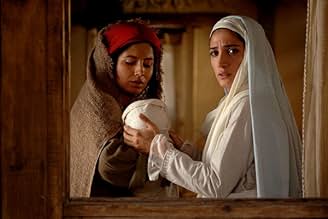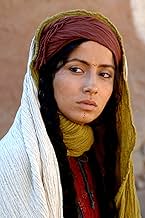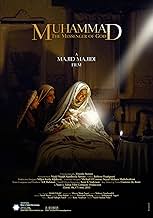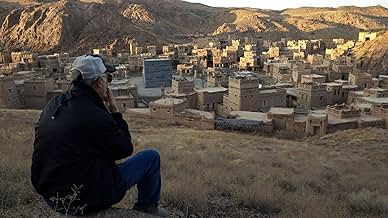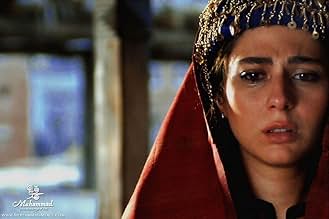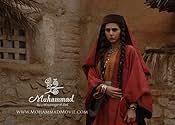Mohammad Rasoolollah
- 2015
- 2h 42min
NOTE IMDb
7,2/10
13 k
MA NOTE
Ajouter une intrigue dans votre langueThe events, trials and tribulations of the city of Makkah in 7th century AD.The events, trials and tribulations of the city of Makkah in 7th century AD.The events, trials and tribulations of the city of Makkah in 7th century AD.
- Réalisation
- Scénario
- Casting principal
- Récompenses
- 1 victoire et 2 nominations au total
Baharak Salehniya
- Thowaiba
- (as Baharak Saleh Nia)
Avis à la une
This film can only be seen by letting go of our logical mind that tries to analyze characters or look for suspense. If you allow your emotions to conduct you, then this film will fulfill you. It's a film that calls on you senses. The vision of beauty, the magical sounds, the loving caress of hands, and even the smell. If smell is one sense that is not yet stimulated in a theater, in this film the evocation is so strong that you smell the sand, the wind, the sea and the perfume of the roses. For Majidi the beauty of the nature and the love between people are the only path to God. Muhammad is an ode to an orphan who had a deep connection with Nature and its Master and became the leader of new religion.
8 years after his last film , once again Majid Majidi has done it.this time with the cooperation of some big names behind the camera. he has made a great film about the childhood of the holy profit , Muhammad.
the story is told in different episodes just like the way Quran tells stories , but here episodes don,t match perfectly and it could be more integrated.
the cinematography is one of the best i have ever seen.it seems that the camera flies everywhere along with the young hero.watching this film is just like watching beautiful paintings in a gallery.
the whole city is actually made in real size and it takes us to 7th CAD. the visual effects ,also is believable and beautifully illustrates a story told in Quran.
the best aspect of the film seems to be the music, made by A.R Rahman. it is really unique and impressive. 3 hours is too much for this drama and it could be shorter.
after all, this is a great film to watch. it,s just a long lovely poem.
the story is told in different episodes just like the way Quran tells stories , but here episodes don,t match perfectly and it could be more integrated.
the cinematography is one of the best i have ever seen.it seems that the camera flies everywhere along with the young hero.watching this film is just like watching beautiful paintings in a gallery.
the whole city is actually made in real size and it takes us to 7th CAD. the visual effects ,also is believable and beautifully illustrates a story told in Quran.
the best aspect of the film seems to be the music, made by A.R Rahman. it is really unique and impressive. 3 hours is too much for this drama and it could be shorter.
after all, this is a great film to watch. it,s just a long lovely poem.
100U
Beautiful movie.
A story of love and pain,of hope and fear,of life and death and of family,it's values and traditions.
The creator of this universe protected the Prophet Muhammad (PBUH) from the early childhood.
In this movie young Prophet Muhammad (PBUH) is shown minus his face,that point could create some controversy.So be aware of this fact before watching the movie.
I do cry at few occasions and smile when the small kid was named as "Muhammad"(PBUH).
Muhammad: The Messenger of God (2015) is an Iranian film written and directed by Majid Majidi. Cinematography was by Vittorio Storaro. Dryden Theatre of Rochester's George Eastman Museum has been honoring Vittorio Storaro, and that's how we were able to to see this movie. (The DVD was Storaro's own personal copy.)
Another reviewer has called this film, "A must-see feast of beautiful colors and tunes." That is absolutely correct. The screen is filled with color and action. The music is beautiful. The acting is outstanding. (We are never shown Muhammad's face, out of respect for Islamic tradition.) We see elephants, camels, horses, and sheep. Director Majidi gives us (literally) a cast of thousands. The desert scenery is spectacular.
Everything works, except that the actual facts about Muhammad's childhood are scarce. Director Majidi concentrates on miracles that Muhammad performs as a child. I've read a fair amount about Islam, and I've never seen any emphasis placed on Muhammad having supernatural powers when he was young. Muhammad was an orphan, and his life was challenging. Some of what was shown is probably historically correct, but I think most of it arose in the mind of writer Majidi.
One major problem for me is that the film is virulently anti-Semitic. As I understand it, Jews weren't involved in Muhammad's life. He accepted the God of Abraham, and he is considered by Muslims to be that God's true and last prophet. However, any violence he encountered was from opposing tribes, not from Jews. Maybe director Majidi is anti-Semitic. My guess is that this was the price he had to pay for the freedom to make this film in Iran.
The movie is three hours long. The good news is that it was never boring. The bad news is that it may have only a tangential bearing on the life of the Prophet Muhammad.
Another reviewer has called this film, "A must-see feast of beautiful colors and tunes." That is absolutely correct. The screen is filled with color and action. The music is beautiful. The acting is outstanding. (We are never shown Muhammad's face, out of respect for Islamic tradition.) We see elephants, camels, horses, and sheep. Director Majidi gives us (literally) a cast of thousands. The desert scenery is spectacular.
Everything works, except that the actual facts about Muhammad's childhood are scarce. Director Majidi concentrates on miracles that Muhammad performs as a child. I've read a fair amount about Islam, and I've never seen any emphasis placed on Muhammad having supernatural powers when he was young. Muhammad was an orphan, and his life was challenging. Some of what was shown is probably historically correct, but I think most of it arose in the mind of writer Majidi.
One major problem for me is that the film is virulently anti-Semitic. As I understand it, Jews weren't involved in Muhammad's life. He accepted the God of Abraham, and he is considered by Muslims to be that God's true and last prophet. However, any violence he encountered was from opposing tribes, not from Jews. Maybe director Majidi is anti-Semitic. My guess is that this was the price he had to pay for the freedom to make this film in Iran.
The movie is three hours long. The good news is that it was never boring. The bad news is that it may have only a tangential bearing on the life of the Prophet Muhammad.
Majidi is a king within the realm of art film, and he sure faced immense challenges managing the first Iranian cinematic project of this scale. The film immerses the audience in an orchestra of beautiful colors, Majidi's specialty, and an outpouring of sublime tunes. Juxtaposed with masterful cinematography of Storaro (although occasionally overdone), Majidi delivers imagery that satisfies aesthetic palates superbly.
The historical period drama, said to be the first part of a trilogy, focuses on prophet Muhammad's childhood. It is of note that, the filmmaker, working within the confines of Islamic conventions, cannot show Muhammad's face, which undeniably renders the project formidable. Hence, the point of view must be shifted, the story must unfold from distributed viewpoints, that must gel together skillfully in order to retain coherence. Though the story does justice vis-à-vis this challenge, it is far from perfection; the script does not mesh well with the visual artistry. The second act is stale, and the last act, though adequate, could be substantially improved. The CGI was noticeably weak; understandable, since it was the very first experience Iranian cinema went through, but still, within the given bounds, could be trimmed down and could easily be improved significantly. This evinces an odd feature of this film: the sense of perfectionism in this film is oddly inconsistent; some parts are perfected masterfully with amazing care, and a few are not even average. In addition to the CGI, the voice of Muhammad is an illustrative example: letting alone professional actors, I am sure that even among Iranian children doing TV commercials there are who are by far better voice actors, both in terms of enunciation and acting, than the kid chosen in this film for the role of Muhammad. What happened to the sense of perfection of the whole team there, I am not sure.
The film strives towards Shia-Sunni neutrality, and succeeds remarkably---unless viewed with absolute cynicism (anything can be deemed as biased if viewed from that lens). The focus is predominantly on the commonalities of the Shia-Sunni accounts, and the chosen story time---Muhammad's childhood---is certainly helpful towards that end. All in all, the film can be best characterized as "promising" (especially when held against the technological status quo of the Iranian cinema) regarding the potentials of cinema for engendering harmony and peace in our ominous and volatile times. It is definitely a must-see.
The historical period drama, said to be the first part of a trilogy, focuses on prophet Muhammad's childhood. It is of note that, the filmmaker, working within the confines of Islamic conventions, cannot show Muhammad's face, which undeniably renders the project formidable. Hence, the point of view must be shifted, the story must unfold from distributed viewpoints, that must gel together skillfully in order to retain coherence. Though the story does justice vis-à-vis this challenge, it is far from perfection; the script does not mesh well with the visual artistry. The second act is stale, and the last act, though adequate, could be substantially improved. The CGI was noticeably weak; understandable, since it was the very first experience Iranian cinema went through, but still, within the given bounds, could be trimmed down and could easily be improved significantly. This evinces an odd feature of this film: the sense of perfectionism in this film is oddly inconsistent; some parts are perfected masterfully with amazing care, and a few are not even average. In addition to the CGI, the voice of Muhammad is an illustrative example: letting alone professional actors, I am sure that even among Iranian children doing TV commercials there are who are by far better voice actors, both in terms of enunciation and acting, than the kid chosen in this film for the role of Muhammad. What happened to the sense of perfection of the whole team there, I am not sure.
The film strives towards Shia-Sunni neutrality, and succeeds remarkably---unless viewed with absolute cynicism (anything can be deemed as biased if viewed from that lens). The focus is predominantly on the commonalities of the Shia-Sunni accounts, and the chosen story time---Muhammad's childhood---is certainly helpful towards that end. All in all, the film can be best characterized as "promising" (especially when held against the technological status quo of the Iranian cinema) regarding the potentials of cinema for engendering harmony and peace in our ominous and volatile times. It is definitely a must-see.
Le saviez-vous
- AnecdotesThis movie will be part of a trilogy. Muhammad will never be shown in any of the three films for the respect of his character. This is specifically done in all media in Islam countries to avoid idolization of a renown character to an actor's face. Instead, he is meant to be known by his religious and historical personality profile.
- Citations
Abdul Muttalib: There is nothing futile in the sight of God.
Meilleurs choix
Connectez-vous pour évaluer et suivre la liste de favoris afin de recevoir des recommandations personnalisées
- How long is Muhammad: The Messenger of God?Alimenté par Alexa
Détails
Box-office
- Budget
- 120 000 000 000 IRR (estimé)
- Montant brut mondial
- 1 440 044 $US
- Durée
- 2h 42min(162 min)
- Couleur
- Mixage
- Rapport de forme
- 2.00 : 1
Contribuer à cette page
Suggérer une modification ou ajouter du contenu manquant


